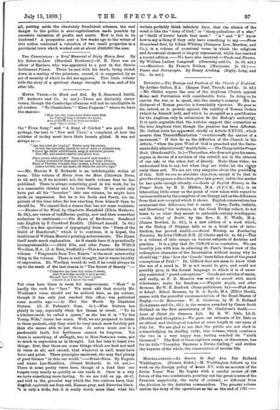Drviurrv. — The Message and Position of the Church of England. By
Arthur Galton, BA. (Kegan Paul, Trench, and Co. 35. 6d.) —Mr. Ghlton argues the case of the Anglican Church against ROme and Puritanism with considerable force. In doing so he carries the war, so to speak, into the enemy's country. flis in- dictment of Roman practice is formidably vigorous. He goes so far, indeed, as to protest against the validity of Roman Orders (which he himself held, and which he seccepted as a qualification for the Anglican only in submission tar the Bishop's authority), It is quite arguable that the Articles support this contention as the true Anglican view, though the practice has been different. Mr. Gallon rests his arguraent chiefly on Article XXVIII., which asserts that Transubitantiation " overthroweth the nature of a sacrament." If this be so, the definition of the Church in the Article, "when the pure Word of God is preached and the Sacra- ments duly administered," doubly fails.— The Clergy and the Prayer Book. (Sands and Co. 2s.)—The author, who does not give his name, argues in favour of a revision of the rubric, not in the interest of one side or the other, but of Liberty. Make them wider, we understand him to say, but when they are wider, let the cllegy carry them out We are not very sanguine about the possibOity of this. Still we see no absolute objection, except it be that to give the clergyman a discretion gives him power, and in this matter he has quite enough already.—Links of English History in the Prayer Book, by H. E. Midden, MA. (S.P.C.K., 6d.), is an interesting little essay on the point of view taken with regard to various matters by the compilers of our liturgy and on the difference from that now occupied which it shows. English conservatism has minimised this difference, but it exists. "Jews, Turks, Infidels, and Hereticks," for instance, in the Good Friday collect, do not Mean to us what they meant to sixteenth-century worshippers. —In Relief of Doubt, by the Rev. R. E. Wegh, MA. (James Bowden, 2s. 6d.), is a new edition of a work which, as the Bishop of Stepney tells U9 in a brief note of intro- duction, has proved useful.—Social Worship an Everlasting Necessity. By John Clifford, D.D. (J. Clarke and CO. 1s. 6d.)-1'his is a volume of able essays on various subjects of doctrine and practice. It is a pity that Dr. Cliffor'd is so combative. We can heartily join with him in admiring St. Paul's broad view of the redemptive character of the Incarnation without seeing why he should say," Alas ! how the ` Creeds ' have fallen short of the grand conceptions of Paul !" Dr. Clifford does not seem to know what the use of a creed is. It is not meant to give, and could not possibly give, in the formal language to which it is of neces- sity restricted, "grand conceptions." Creeds are articles of union, and really, as F. D. Maurice was wont to assert with much vehemence, make for freedom.—Wayside Angels, and other Sermons. By W. K. Burford. (Same publishers. is.)—High Aims at School : School Sermons, by R. A. Byrde, M.A. (Ellict Stock), comes with the powerful recommendation of the Head-Master of Rugby.—In Memoriam: TV. E. Gladstone, by H. S. Holland (Longmans and Co., 6d.), is the sermon preached by Canon Scott Holland on the first anniversary of Mr. Gladstone's death.— Laws of Christ for Common Life. By R. W. Dale, LL.D. (Hodder and Stoughton.)—We gave our estimate of Dr. Dale as an ethical and theological teacher at some length in our issue of July 1st. We are glad to see that the public are not slack in acknowledging its sterltng vable, this volume, which combines the two in a very happy way, hating reached its nintla thousand." The first of these eighteen essays, or discourses, has for its title "Everyday Business a Divine Calling," and strikes the keynote of the whole, the consecration of secular life.






































 Previous page
Previous page